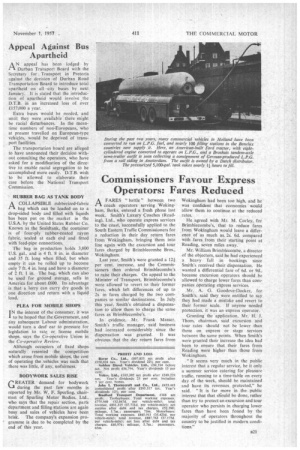Appeal Against Bus Apartheid
Page 55

If you've noticed an error in this article please click here to report it so we can fix it.
ik N appeal has been lodged by 1-"k Durban Transport Board with the Secretary for Transport in Pretoria against the decision of Durban Road Transportation Board to introduce total apartheid on all -city buses by next. January. It is stated that the introduction of apartheid would involve the D.T.B. in an increased loss of over 4157,000 a year.
Extra buses would be needed, and until they were available' there might be racial disturbances. In the meantime numbers of non-Europeans, who at present travelled on European-type vehicles, would be deprived of transport facilities.
The transportation board are alleged to have announced their decision without consulting the operators, who have asked for a modification of the directive to enable racial segregation to be accomplished more easily. D.T.B. wish to be allowed to elaborate their case before the National Transport Commission.
RUBBER BAG AS TANK BODY
A COLLAPSIBLE rubberized-fabric
bag which can be loaded on to a drop-sided body and filled with liquids has been put on the market in the U.S.A. by the United States Rubber Co. Known as the SeaIdtank, the container is of four-ply rubber-coated rayon fabric, sealed at each end and fitted with feed-pipe connections.
The bag in production holds 3,800 U.S. gal., and is 4 ft. 8 in. in diameter and 35 ft. long when filled, but when empty it can be rolled up to become only 7 ft. 4 in. long and have a diameter of 2 ft. 1 in. The bag, which can also be used for ground storage, sells in America for about £600. Its "advantage is that a lorry can carry dry goods in one direction and return with a liquid load.
PLEA FOR MOBILE SHOPS
IN the interest of the consumer, it was I to be hoped that the Government, and any subsequent Labour administration, would turn a deaf ear to pressure for legislation to rate or license mobile shops. says the Co-operative Union in the Co-operative Review.
Although occupiers of fixed shops naturally resented the competition which arose from mobile shops, the cost of operating the vehicles was such that there was little, if any, unfairness.
BODYWORK SALES RISE
GREATER demand for bodywork during the past few months is reported by Mr. W. F. Spurling, chairman of Spurling Motor Bodies, Ltd., who says that the repair section, parts department and filling stations are again busy and sales of' vehicles have been brisk. The company's expansion programme is due to be completed by the end of this year.
























































































































